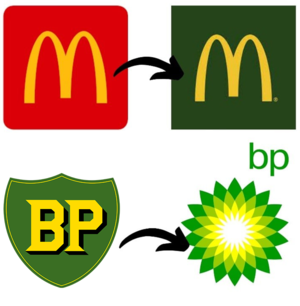Greenwashing: Difference between revisions
mNo edit summary |
mNo edit summary |
||
| (6 intermediate revisions by the same user not shown) | |||
| Line 1: | Line 1: | ||
[[File:Greenwashing logo transition.png|alt=Greenwashing logo transition|thumb|'''Figure 1'''. BP's logo is a flower, 98% of its revenue comes from the fossil fuel industry.]] | |||
'''Greenwashing is a public relations strategy where a company highlights its positive [[externalities]] to avoid public scrutiny of its relatively much larger negative [[externalities]] contribution.''' In economics it is a logical consequence of [[Corporation|corporations]] trying to reduce costs whilst retaining its customer base. The most prominent cases include: | |||
== | == Volkswagen == | ||
In the early 2000's, the Volkswagen corporation, was confronted with a dilemma. Market forces were changing, consumers and governments increasingly worried about the [[ecological crisis]] demanded that all car manufacturers meet specific emissions targets. Volkswagen did a cost analysis that found that redesigning their cars to be more efficient would be extremely expensive. So Volkswagen instead of reducing the negative externalities of their product decided to fit 11 million vehicles with a “defect” device. This device included software that could detect when it was undergoing an emissions test and altering the performance to reduce the emissions level. | In the early 2000's, the Volkswagen corporation, was confronted with a dilemma. Market forces were changing, consumers and governments increasingly worried about the [[ecological crisis]] demanded that all car manufacturers meet specific emissions targets. Volkswagen did a cost analysis that found that redesigning their cars to be more efficient would be extremely expensive. So Volkswagen instead of reducing the negative externalities of their product decided to fit 11 million vehicles with a “defect” device. This device included software that could detect when it was undergoing an emissions test and altering the performance to reduce the emissions level. | ||
| Line 7: | Line 8: | ||
== Why enact change when you can lie? == | == Why enact change when you can lie? == | ||
If you are human, the question above might seem dubious. However, [[Corporation|corporations]] which | If you are human, the question above might seem dubious. However, [[Corporation|corporations]] which by law have the same rights as humans<ref>'''Santa Clara County v. Southern Pacific''', U.S. Supreme Court (1886): 118 U.S. 394. Decided: May 9, 1886. Accessed 6<sup>th</sup> Jan 2022 via https://supreme.justia.com/cases/federal/us/118/394/</ref>, don't seem to think this is an issue. This is because although they have been given the same rights as a human, they should not as at their heart they are profit driven [[machines]]. This gives them and the people that work for them (via [[Fiduciary Duty|fiduciary duty]]) the behavioural characteristics of a machine, unfeeling, unremorseful. | ||
'''Reference''' | |||
Latest revision as of 06:36, 3 November 2022
Greenwashing is a public relations strategy where a company highlights its positive externalities to avoid public scrutiny of its relatively much larger negative externalities contribution. In economics it is a logical consequence of corporations trying to reduce costs whilst retaining its customer base. The most prominent cases include:
Volkswagen
In the early 2000's, the Volkswagen corporation, was confronted with a dilemma. Market forces were changing, consumers and governments increasingly worried about the ecological crisis demanded that all car manufacturers meet specific emissions targets. Volkswagen did a cost analysis that found that redesigning their cars to be more efficient would be extremely expensive. So Volkswagen instead of reducing the negative externalities of their product decided to fit 11 million vehicles with a “defect” device. This device included software that could detect when it was undergoing an emissions test and altering the performance to reduce the emissions level.
While this was going on, the company's public marketing efforts highlighted the low emissions and eco-friendly attributes of their automobiles. Actually, the nitrogen oxide emissions from these engines were up to 40 times the legal limit.
Why enact change when you can lie?
If you are human, the question above might seem dubious. However, corporations which by law have the same rights as humans[1], don't seem to think this is an issue. This is because although they have been given the same rights as a human, they should not as at their heart they are profit driven machines. This gives them and the people that work for them (via fiduciary duty) the behavioural characteristics of a machine, unfeeling, unremorseful.
Reference
- ↑ Santa Clara County v. Southern Pacific, U.S. Supreme Court (1886): 118 U.S. 394. Decided: May 9, 1886. Accessed 6th Jan 2022 via https://supreme.justia.com/cases/federal/us/118/394/
